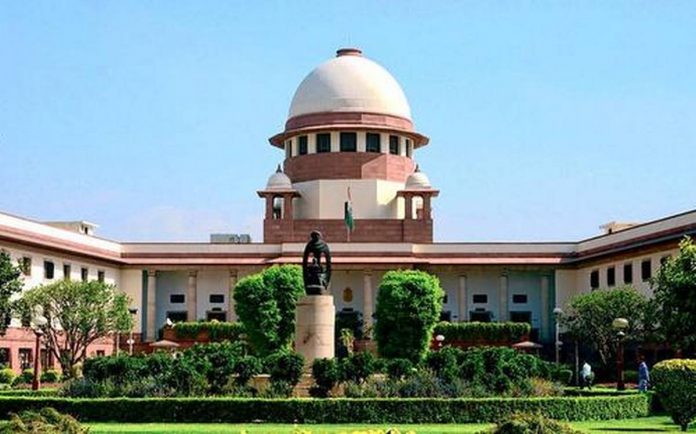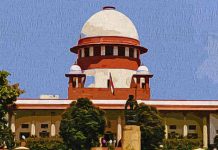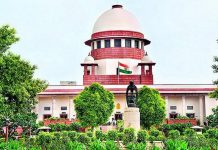This article is written by Gyaaneshwar Joshi, a student of the Faculty of Law, Jamia Millia Islamia, New Delhi. This article gives an overview of the recent guidelines by the Supreme Court for speedy disposal of criminal cases against legislators.
Table of Contents
Introduction
Currently, a large part of the voting population views their representatives as their problem solvers. Therefore, the quality of candidates contesting elections becomes important because they make laws that govern our society.
Growing criminalisation has been a constant issue with Indian politics. The Supreme Court delivered key orders in an attempt to clean up the political system tainted with criminals. The court has passed certain judgments and orders to take a step forward towards ensuring accountability and transparency in law-making bodies. The political parties also welcomed the court’s intervention, by saying that it will help to deal with the increasing criminalisation in politics.
The issue of criminalisation in Indian politics : cause for concern
The criminalisation of politics means that the criminals enter politics, contesting elections, and even get elected to the Parliament and state legislature. The Supreme Court has flagged several times an alarming increase in the incidence of criminals in politics. The Constitutional bench in 2018 held that rapid criminalisation of politics cannot be arrested by merely disqualifying tainted legislators but should begin by ‘cleansing’ political parties. On 13 February 2020, the Supreme Court while hearing the petition of Public Interest Foundation v. Union of India (2018), directed all the political parties to publish criminal antecedents of contesting candidates and the reason for selecting such candidates to fight for an election. The Election Commission of India (ECI) also came in favour of this ruling and issued a directive to implement these orders concerning criminal antecedents of candidates.
The Association for Democratic Reforms (ADR), an organisation established in 1999, primarily works for conducting a detailed analysis of the backgrounds of the contesting political candidates. In collaboration with the National Election Watch, ADR conducts election watches for almost all states in parliamentary elections. In 2019, ADR published a comprehensive report of Lok Sabha elections titled ‘Analysis of Criminal Background, Financial, Education, Gender and other details of Winners’ and presented complete details of the percentage of winners with criminal cases in 2009, 2014, and 2019 Lok Sabha elections.
As per the data mentioned in the report, out of the 539 winners in the 2019 Lok Sabha elections, 233 (43%) have declared criminal cases against themselves. Whereas, 159 (29%) winners have declared serious criminal cases against them, including rape, murder, kidnapping, attempt to murder, crimes against women, etc.
Whereas, in the results of the 2014 Lok Sabha elections, a total of 542 were declared winners and elected, in which 185 (34%) winners have declared criminal cases against themselves, and 112 (21%) have declared serious criminal cases over them. Similarly, in the 2009 Lok Sabha elections, out of 521 winners, 158 (30%) had declared criminal cases against themselves, whereas 77 (15%) had serious criminal cases. The report stated an alarming increase of 44% in the number of MPs with declared criminal cases and 104% with serious cases since 2009.
During the last few decades, various committees have been formed to check out the growing criminalisation of Indian politics and its implications. Dinesh Goswami Committee on the Electoral reforms (1990) had earlier expressed deep concern over the growing criminal forces in politics. Similarly, N.N. Vohra Committee Reports (1993) reiterated the disturbing trend of growing criminal forces in Indian politics.
Supreme Court’s intervention on rising criminalisation of politics
In 2011, an NGO named Public Interest Foundation approached the Supreme Court for disqualification of candidates with serious criminal cases pending against them. Several petitions were filed in the Supreme Court, therefore in the case of Union of India v. Association for Democratic Reforms (2002), the court finally held the right to information- the right to know antecedents including the criminal past, or assets of a candidate as a fundamental right under Article 19(1)(a) of the Constitution. Later in the case of Public Interest Foundation v. Union of India (2015), the Supreme Court directed the disposal of criminal cases against the elected representatives within one year from the date of the framing of charge. However, in pursuance of the directions given by the Supreme Court, hardly any case was disposed of within one year. Any of the High Court took no follow-up actions to comply with the directions of the Supreme Court.
The directions given by the Supreme Court while hearing the latest PIL of Ashwini Kumar Upadhyay v. Union of India (2021), the court decided to set up more special courts for speedy trials of the criminal cases against sitting and former MPs and MLAs. Earlier the Supreme Court on 17 September 2020 directed the Chief Justices of High Courts to set up twelve special courts across 11 states to deal with cases related to elected representatives. Now, the Court mulled on the establishment of the special courts per district in every state for the trial of criminal matters against lawmakers. The Court further allowed for the video conferencing to be done for recording evidence and robust implementation of the witness protection schemes by the concerned courts, whether the court is hearing or the hearing is pending against the lawmakers.
An overview of Ashwini Kumar Upadhyay’s petition
In 2016, the petition was filed by the BJP leader and lawyer Ashwini Kumar Upadhyay seeking speedy disposal of criminal cases against sitting and former MPs and MLAs. The petition was submitted by Senior Advocate and Amicus Curiae, Vijay Hansaria who provided comprehensive details of all MPs/MLAs and the status of their pending cases. [Ashwani Kumar Upadhyay v. Union of India and others (2016)].
Advocate Vijay Hansaria again submitted a report in terms of Supreme Court orders dated 05 March 2020 and 31 August 2020 in which he raised the issue of the lack of implementation of Supreme Court orders against accused lawmakers. The salient features of the report are as follows:
- There are a total of 4442 cases pending against sitting and former MPs and MLAs in different courts and special courts, out of which 2556 cases are against sitting legislators. The number of legislators involved is more than a number of total cases since there is more than one accused in one case, and the same legislator is accused in more than one case.
- There are 413 MPs and MLAs who are accused of the offences punishable with life imprisonment, whereas 174 cases are on sitting legislators.
- The trial of 352 cases has been stayed by the different state High Courts and Supreme Court whereas a large number of cases are pending at the appearance stage.
- In a large number of cases, even charges have not been framed including on those offences that have punishment for life imprisonment. There are many cases in which a non-bailable warrant has been issued by the court but culprits are not executed.
- Only one special court is established in the states of Andhra Pradesh, Tamil Nadu, Madhya Pradesh, Karnataka, Telangana and West Bengal where all cases are pending. The petition prayed that whichever special court constituted shall exercise jurisdiction over other cases as well, in addition, to try cases against MPs and MLAs.
New directions issued by the Supreme Court in view of the petitions
In August 2021, the Supreme Court accepted the recommendations of Advocate Vijay Hansaria after he filed the 13th report on the petition of Ashwini Kumar Upadhyay v. Union of India and Anr (2016). The Court, after hearing the petition, asked the Centre to take a final call and submit details regarding criminal cases pending against legislators across the country. In view of this judgment, the Court imposed a fine on some political parties for their failure to comply with the judgment in the Bihar elections and for not disclosing criminal antecedents of candidates contesting polls. The fine of Rs. 5 lakh was imposed on CPI (M) and NCP and Rs. 1 lakh fine on BJP, INC, Janta Dal, CPI, RJD and LJP.
The Supreme Court decided to modify the judicial trials on the matters pending against the legislators. The major decisions are taken by the Supreme Court on speedy disposal of criminal cases against legislators:
- The Supreme Court mulled the formation of a special bench to monitor the progress of investigation and trial of criminal cases involving politicians. In a report, the Court agreed to several suggestions given by amicus curiae Advocate Vijay Hansaria and Advocate Sneha Kalita, including a freeze on the transfer of judicial officers trying criminal cases against lawmakers. Judicial officers hearing cases against legislators must have to continue their positions so that there should be no political interference during the trial.
- The Court accepted to adopt video conferencing to examine witnesses giving their testimonials against the accused Legislator. The Court has decided to release sufficient funds for the establishment of virtual courts with better technology.
- Emphasising the safety of witnesses, the Supreme Court has stressed the strict implementation of the Witness Protection Scheme, 2018, for the safety of witnesses associated with the particular matter. This rule is given to encourage witnesses so that they can feel safe and comfortable in the whole judicial process.
- The Supreme Court directed that no prosecution against sitting or former MPs or MLAs can be withdrawn without the permission of the High Court of the concerned cases. The Court further directed that Judges hearing criminal cases against MP or MLA in a special court must have to continue in their current posts until the further Supreme Court orders. These directions are subject to the retirement or death of the Judges holding the trial against the Legislator.
- Earlier, various state governments have resorted to the withdrawal of numerous criminal cases pending against MPs/MLAs by utilising the power vested under Section 321 of the Code of Criminal Procedure, 1973. This Section allows the withdrawal of a person from prosecution, under which a Public Prosecutor or Assistant Public Prosecutor in charge of the case, with the court’s consent, can withdraw the prosecution of any person in respect of offence(s) for which a person is tried. Now, the Court directed the High Courts to utilise the power vested under Section 321 of the Code of Criminal Procedure, 1973 only in the public interest and not to use it for extraneous and political considerations. A bench of Chief Justice N.V. Ramana, Justice Vineet Saran and Justice Surya Kant directed that power is required to be utilised with utmost good faith to serve the larger public interest.
- The Supreme Court Bench pointed out how the central government agencies like Enforcement Directorate produce sketchy evidence on the matters filed against sitting and former politicians. The Bench gave a last opportunity to the Central Government to submit a detailed report on the cases registered by CBI, ED, and other agencies against MPs and MLAs.
- The Court now directed all the political parties to declare the criminal antecedents of a contesting person in bold letters in election affidavits before filing their candidature. It has to be done in a minimum of forty-eight hours of the selection of the candidate or not less than two weeks before the first date of filing the nomination, whichever is earlier. While there are lots of politicians who argue that many cases against them are politically motivated. Therefore, the Supreme Court now allowed the voters to decide based on the criminal antecedents produced by the political parties whether they want to vote for a candidate with a criminal history or not.
The Supreme Court gave these directions under Article 141 of the Indian Constitution, which is binding on all the High Courts throughout the Indian territory. The Supreme Court has given directions to the Chief Justice of all the High Courts to work on the speedy implementation of these orders.
Highlights of the Supreme Court’s orders
There are the major steps taken by the Supreme Court in the right direction that will provide a logical conclusion to the cases. Now, most cases will be expedited against Legislators so that the final decision can be taken on time. The main decisions taken by the Supreme Court are as follows:
- The Supreme Court has approved the Witness Protection Scheme, 2018, formulated by the Ministry of Home Affairs for the safety of a witness. Now, the witness need not apply for the protection, but the Court itself will give the protection.
- Day to day hearing of the matters against Legislators shall be done for the speedy disposal of the cases.
- More special courts shall be constituted, and video conferencing shall be done to maintain transparency in the decisions.
- The tenure of the Judge hearing the matter is now fixed. The particular Judge cannot be transferred in the middle of the trial until Supreme Court orders, and the Judge shall have experience of working for two consecutive years in that particular Court before sitting for a trial.
Analysis of the new guidelines
Over the years, the Supreme Court has passed many judgments that sought to curb the criminalisation of politics, but the extent of the problem has not been eliminated. No political party offers an explanation as to why candidates with pending criminal cases are selected as candidates.
The Parliament needs to come up with strong laws that will permanently disqualify candidates with criminal records from contesting elections. Till now, majorly whatever progress made for decriminalising politics, all has been done through the efforts of the Supreme Court and the Election Commission, but no efforts have been made by the Parliament. It is time for the Parliament to make laws to eradicate undeserved elements from the politics who are contributing to the process of making laws for the country.
Conclusion
In the present criminal justice system, it takes years or decades to complete a trial against politicians. Those with political influence have taken full advantage by delaying hearings, obtaining repeat adjournments, and filing innumerable interlocutory petitions to stall any progress. They also engage in corrupt activities and infect the bureaucracy.
The judicial system will have to be overhauled drastically to ensure that justice is dispensed swiftly in all cases. Addressing the entire value chain of the electoral system is the key to solve the criminalisation of politics. A single-pronged legislative and judicial solution cannot effectively help to reform the electoral system.
References
- https://www.livelaw.in/top-stories/supreme-court-on-mla-mp-criminal-prosecution-pulls-up-centre-for-lack-of-progress-in-case-disposal-and-filing-status-reports-179290?infinitescroll=1
- https://www.hindustantimes.com/india-news/hc-nod-a-must-to-drop-cases-on-politicians-supreme-court-101628639130319.html
- https://www.thehindu.com/news/national/supreme-court-orders-parties-to-publish-criminal-history-of-candidates/article30808148.ece
- https://www.livelaw.in/4122-cases-pending-against-legislators-amicus-curiae-submits-report-to-sc-read-report/?infinitescroll=1
- https://www.livelaw.in/top-stories/judges-handling-criminal-cases-against-mps-mlas-should-not-be-transferred-until-further-orders-supreme-court-179236?infinitescroll=1
Students of Lawsikho courses regularly produce writing assignments and work on practical exercises as a part of their coursework and develop themselves in real-life practical skills.
LawSikho has created a telegram group for exchanging legal knowledge, referrals, and various opportunities. You can click on this link and join:
https://t.me/joinchat/J_0YrBa4IBSHdpuTfQO_sA
Follow us on Instagram and subscribe to our YouTube channel for more amazing legal content.
 Serato DJ Crack 2025Serato DJ PRO Crack
Serato DJ Crack 2025Serato DJ PRO Crack











 Allow notifications
Allow notifications


